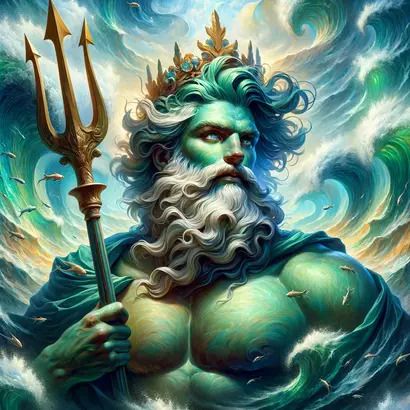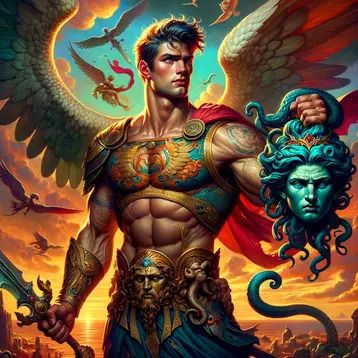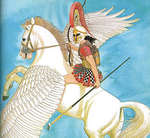
Pegasus
In Greek mythology, Pegasus was an immortal winged horse, one of the two children of Poseidon and Medusa. Along with his brother, the golden-sworded Chrysaor, Pegasus sprang forth most miraculously from his pregnant mother’s neck after Perseus had beheaded her. He belonged to the Greek hero Bellerophon for some time, before being stabled by Zeus and tasked with drawing the chariot of his thunderbolts.
Pegasus and Water Springs
Hesiod says that Pegasus’ name originates in the Greek word for springs, pegae, since he was supposedly born near the springs of Ocean. But he was also associated with waters due to an extraordinary trait of his he had inherited from his father.
Namely, just like Poseidon, Pegasus was capable of creating water streams wherever he’d struck his hoof. At least two famous springs in Greece, both named Hippocrene (“Horse Spring”), were widely believed to have been issued forth by Pegasus’ hoof. The more famous one of the two was located on Mount Helicon, the sacred abode of the Muses; its waters, when drunk, enthused poets with inspiration and creativeness.
Pegasus and Bellerophon
For a brief period of time, Pegasus belonged to a mortal, Bellerophon, the celebrated hero and slayer of monsters.
The Taming of Pegasus
Notoriously wild and free-roaming, Pegasus was finally tamed by one of the greatest Greek heroes, Bellerophon. But he didn’t do it by himself: he had a lot of help from Athena. According to Pindar, one of the most celebrated Ancient Greek poets, the goddess gifted him with a charmed golden bridle, which Bellerophon used to capture Pegasus when the stallion was drinking water at the Pierian spring, another water source associated with Pegasus and the Muses.
Pegasus and Bellerophon’s Adventures
Riding on Pegasus, Bellerophon was capable of overcoming the Amazons, the fire-breathing Chimaera, and the warlike Solymi. In addition, Pegasus was the means through which Bellerophon exacted his revenge on Jobates’ wife, Stheneboea, who testified falsely against Bellerophon after he had rejected her advances. According to some, afterward Bellerophon offered her a ride on Pegasus, which she gladly accepted; however, as they were flying over the sea, the winged stallion flung her down to its depths.
The Death of Bellerophon
Little did Bellerophon knew at the time that he would meet a similar fate. After his numerous victories against all kinds of opponents, Bellerophon started believing that the mortals aren’t worthy of his presence and that he deserves to live among the gods on Mount Olympus. So, he mounted his faithful horse and started his faithful journey upward. Zeus, angered by Bellerophon’s hubris, soon sent a gadfly which stung Pegasus bad enough that the winged horse threw his rider down to earth and to his death.
Pegasus in Heavens
After some time, the riderless Pegasus did reach Olympus. Zeus stabled him with his other steeds and soon after tasked him with drawing his thunderbolt-carrying chariot. After years of service, Zeus awarded Pegasus with a constellation, which bears his name to this very day.
Pegasus Sources
Hesiod documents Pegasus’ birth and the origin of his name in the early passages of his “Theogony.” You can read the story of Bellerophon and Pegasus in Pindar’s 13th Olympian Ode, in the thirty or so verses beginning with the 60th. As is often the case, you can find an informed summary of it in Apollodorus’ “Library.”
Pegasus Video
Pegasus Q&A
Pegasus Associations
Link/Cite Pegasus Page
Written by: The Editors of GreekMythology.com. GreekMythology.com editors write, review and revise subject areas in which they have extensive knowledge based on their working experience or advanced studies.
For MLA style citation use: GreekMythology.com, The Editors of Website. "Pegasus". GreekMythology.com Website, 05 Apr. 2021, https://www.greekmythology.com/Myths/Creatures/Pegasus/pegasus.html. Accessed 26 April 2024.




